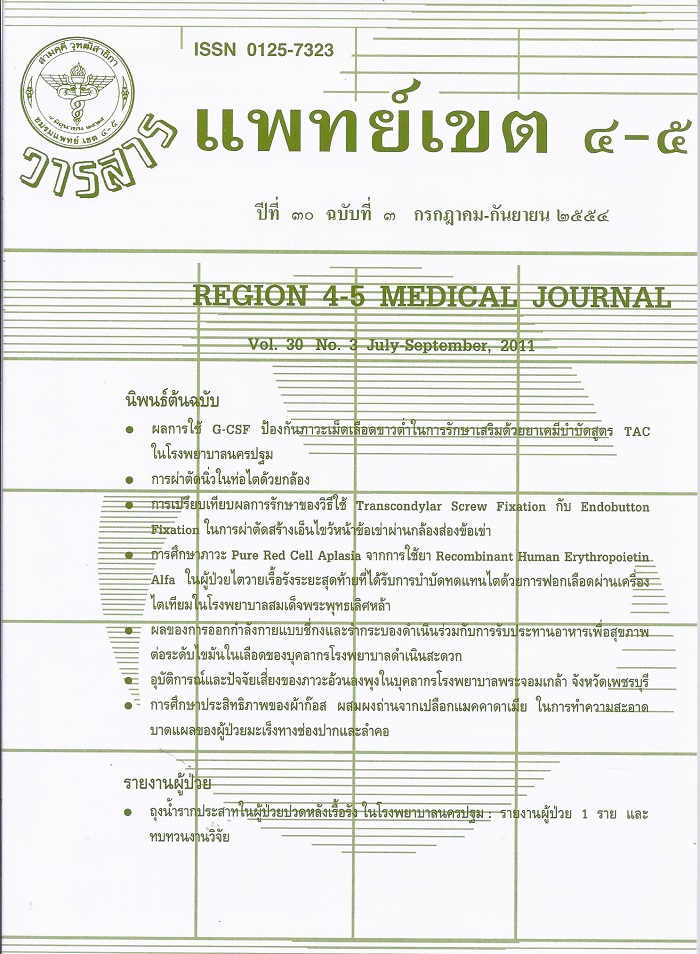ประสิทธิผลของโปรแกรมการจัดการภาวะคลื่นไส้อาเจียน ในผู้ป่วยมะเร็งลำไส้ใหญ่และทวารหนักที่ได้รับยาเคมีบำบัด
คำสำคัญ:
คลื่นไส้อาเจียน, เคมีบำบัด, มะเร็งลำไส้ใหญ่และทวารหนัก, การหายใจแบบมีประสิทธิภาพร่วมกับน้ำมันหอมระเหยเปปเปอร์มิ้นบทคัดย่อ
The present study was experimental research with a simple change over design which aimed at investigating the effectiveness of a nausea and vomiting management program on nausea and vomiting for colorectal cancer patients receiving chemotherapy. The study sample consisted of 30 colorectal cancer patients who were hospitalized at a special ward and a general ward at Nakhonpathom hospital. During the experimental period, the subjects received the nausea and vomiting management program, while in the control period, the subjects received only routine nursing care. The instruments used in this study included the nausea and vomiting management program for colorectal cancer patients receiving chemotherapy, a general information record form and a nausea and vomiting assessment scale. Data were analyzed in terms of frequency, percentage, mean and standard deviation. The dependent t-test and one-way repeated measures ANOVA were also employed to determine the differences in post-test scores at 30 minutes. Finally, paired scores were tested using the Bonferroni method.
The study findings revealed that at 30 minutes after receiving the nausea and vomiting management program, the subjectsí nausea and vomiting mean scores were lower than those obtained at 30 minutes after receiving routine nursing care with statistical significance (p < .05). In addition, the nausea and vomiting mean scores of patients at 0, 30, 60, 90, 120 and 150 minutes after receiving the nausea and vomiting management program were lower with statistical significance (p < .05) Also, the paired testing using the Bonferroni method revealed that the mean scores of nausea and vomiting at 0, 30, 60, 90, 120 and 150 minutes after receiving the nausea and vomiting management program were lower than those obtained before receiving the nausea and vomiting management program with statistical significance and the nausea and vomiting mean scores of patients at 0, 30, 60, 90, 120 and 150 minutes after receiving routine nursing care were also lower with statistical significance (p < .05). The paired testing using the Bonferroni method showed that the mean scores of nausea and vomiting at 0, 30, 60, 90, 120 and 150 minutes after receiving routine nursing care were lower that obtained before receiving routine nursing care with statistical significance.
Based on the study findings, it could be concluded that the nausea and vomiting management program is an alternative that can be used to reduce nausea and vomiting for colorectal cancer patients receiving chemotherapy. Moreover, training on the nausea and vomiting management program should be organized for caregivers to help reduce nausea and vomiting after the patients have received chemotherapy to increase relaxation, decrease stress and anxiety, and enhance quality of life of both patients and their family members.
ดาวน์โหลด
เผยแพร่แล้ว
รูปแบบการอ้างอิง
ฉบับ
ประเภทบทความ
สัญญาอนุญาต
ลิขสิทธิ์บทความเป็นของผู้เขียนบทความ แต่หากผลงานของท่านได้รับการพิจารณาตีพิมพ์ลงวารสารแพทย์เขต 4-5 จะคงไว้ซึ่งสิทธิ์ในการตีพิมพ์ครั้งแรกด้วยเหตุที่บทความจะปรากฎในวารสารที่เข้าถึงได้ จึงอนุญาตให้นำบทความในวารสารไปใช้ประโยชน์ได้ในเชิงวิชาการโดยจำเป็นต้องมีการอ้างอิงถึงชื่อวารสารอย่างถูกต้อง แต่ไม่อนุญาตให้นำไปใช้ในเชิงพาณิชย์




